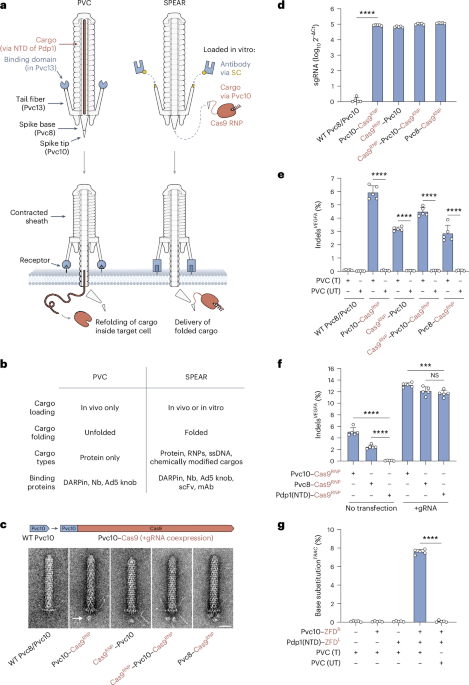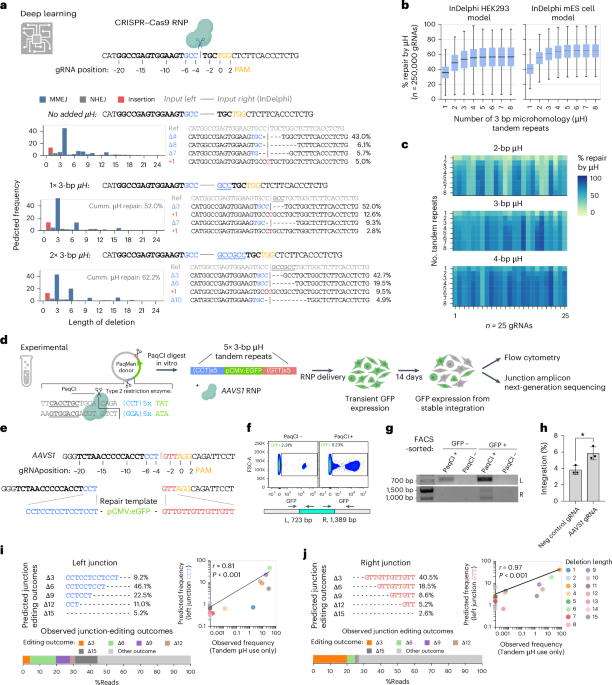Now Reading: Engineered Bacterial Nanosyringes Enable Precision Biomolecule Delivery
-
01
Engineered Bacterial Nanosyringes Enable Precision Biomolecule Delivery
Engineered Bacterial Nanosyringes Enable Precision Biomolecule Delivery

speedy Summary:
- Contractile Injection Systems (ciss) are syringe-like complexes used by prokaryotes and viruses to inject effector molecules into cells.
- researchers have engineered the Photorhabdus Virulence cassette (PVC) system to deliver proteins, DNA, and RNA into human cells for therapeutic purposes.
- A breakthrough innovation named Spike Engineering and Retargeting (SPEAR) allows modular cargo loading and precise targeting of cell types using PVC systems.
- Experiments demonstrated effective delivery of proteins like Cas9 ribonucleoproteins (RNPs),enabling gene editing in HEK293FT human cells without transfection procedures.
- PVC modifications include external cargo loading using spike proteins for folded cargos, internal tube-based cargo loading, simultaneous delivery of multiple components like DNA templates alongside Cas9 RNPs, and retargeting specificity through conjugation with antibodies or other markers.
- Photos demonstrate molecular models of assembly systems, data analysis results showing indels/DNA insertions efficiency in targeted environments.
Indian Opinion Analysis:
The advancements in reprogramming contractile injection systems signal transformative potential for biomedical applications globally, including India’s emerging biotech sector. Technologies like SPEAR could revolutionize precision medicine by allowing highly specific cell-targeted treatments while overcoming traditional barriers such as reliance on transfection procedures or unfolded protein incompatibilities during delivery processes.
For India-a country pushing toward self-reliance in healthcare innovations-adopting such modular engineering platforms might empower researchers to tackle diseases at the cellular level more effectively. Indigenous research tailored around CIS systems may open up affordable therapeutic solutions thereby reducing dependency on expensive imports while nurturing a skilled workforce within bioengineering fields.These developments underscore opportunities for collaboration between India’s scientific institutions and international experts working toward medical breakthroughs based on CIS technology frameworks like PVC operations coupled with SPEAR mechanisms.
Source Link: Read More.Quick Summary:
- Scientists demonstrated a system using Programmable Vascular Contractile (PVC) structures to deliver biomolecular cargos across diverse cell types.
- PVCs were engineered to deliver single-stranded DNA, Cas9 RNPs, and modified targeting proteins for precise genetic editing.
- Applications include human immune cells and live organisms, reducing off-target effects while maintaining high specificity.
- The technology enables modular cargo delivery with wide-ranging uses in biotechnology,including therapeutic cell programming.
Indian Opinion Analysis:
This growth is significant for India’s emerging biotech landscape because it represents a leap towards scalable gene-editing technologies. With applications spanning human healthcare innovations, agricultural advancements (targeting plants/fungi), and immunological therapies, such systems could spearhead transformative breakthroughs in areas like disease treatment or crop resilience enhancement.It may offer India an opportunity to further its bioscience capabilities and position itself as a leader in precision biotech tools if integrated effectively into national research initiatives or collaborations with global entities.
Read morequick Summary:
- The raw text describes advanced biochemical processes for targeted DNA cargo delivery via engineered bacterial nanosyringes.
- Various methodologies, such as protein-DNA conjugation, in vitro retargeting experiments, and biochemical assessments like immunoblots, are detailed.
- Techniques used include electron microscopy imaging to observe protein loading on nanosyringe complexes and reverse transcription PCR (RT-qPCR) for sgRNA quantification.
- Live-cell experiments were conducted to measure efficiency in gene-editing and cytotoxicity assays using innovative PVC constructs.
- Protocols covered cell cultures under laboratory conditions with growth mediums utilizing fetal bovine serum and gentamicin,among other supplements.
- In vivo studies involving mice were highlighted to test the functionality of the nanosyringe systems for B-cell depletion assays and immune response neutralization tests.
- Statistical procedures included a combination of Student’s t-tests or one-way ANOVA for reproducibility checks across biological samples.
Indian Opinion Analysis:
The research represents groundbreaking advancements in molecular biotechnology with potential applications ranging from gene therapy to cancer treatment methodologies. For India-a country grappling with challenges like genetic diseases-the efficient delivery mechanisms powered by nano-engineering hold immense promise in revolutionizing medical treatments. moreover, this type of development could spark collaborative efforts between Indian bio-research institutes and global entities focused on leveraging scientific innovation not only in healthcare but also agriculture or environmental concerns.
Policy implications may arise concerning access equity given India’s vast socio-economic divides; ensuring advanced medicine is affordable remains crucial alongside fostering international partnerships that drive indigenous scientific capacity-building.
Link: Read More
Quick Summary:
- The raw text focuses on advancements in microbiology,notably involving contractile injection systems (CIS),a mechanism found in bacteria.
- CIS are structures resembling phage tails and are capable of delivering proteinaceous effectors into host cells or other organisms.
- Studies highlighted include those exploring the structural basis, mechanisms of translocation, programmable protein delivery, and effector interactions with targets.
- Applications of CIS range from bacterial competition (e.g., elicits DNA damage) to engineering systems for targeted delivery.
Indian Opinion Analysis:
The research on contractile injection systems reflects the innovative understanding of microbial mechanisms with implications for diverse fields such as biotechnology and medicine. For India, a growing focus on life sciences could be beneficial in adopting these advancements, especially for targeted drug delivery or combating pathogens. As global research progresses rapidly, India’s scientific community might find opportunities to collaborate internationally to leverage these discoveries while addressing local health challenges effectively.Read more at: PubMed Central referenceQuick Summary:
- The provided text contains references to multiple scientific studies and advancements in biotechnology, including genome editing technologies like Cas9-mediated homology-directed repair and protein delivery systems such as Type VI secretion mechanisms.
- Studies mentioned include applications of zinc-finger deaminases for DNA editing, engineered bacterial nanosyringes for targeted biomolecule delivery, and non-invasive imaging techniques for monitoring immune responses.
- Specific articles detail innovative interactions in peptide-protein engineering and therapeutic production levels through advanced engineered biotechnological methods aimed at addressing medical needs.
Indian Opinion Analysis:
Biotechnology is rapidly evolving globally, with significant implications for India’s scientific research landscape. Advancements such as genome-writing tools or bacterial-derived injection systems hold potential applications across healthcare and agriculture-key sectors in India. Enhanced precision in genomic edits can assist India’s efforts in affordable medical innovations or solving food security challenges via crop enhancements. Cross-disciplinary collaborations between Indian biotechnologists and international peers could further accelerate outcomes tailored to India’s unique population-scale demands while navigating ethical considerations tied to genetic manipulation.
Read more: [source Link Provided]Quick Summary:
- A scientific team at institutions including MIT and Harvard has developed engineered bacterial nanosyringes for programmable delivery of biomolecules.
- These nanosyringes use contractile injection systems (CIS) to deliver diverse cargos, like proteins and DNA, into human cells with high precision.
- Key innovations include targeted mechanisms enabled by spike engineering (Pvc8/Pvc10) and retargeting moieties like antibody fragments or receptor-binding proteins.
- The system demonstrates efficiency in vitro and in vivo, including selective delivery to specific cell types in mice without off-target effects.
- Functional storage conditions were optimized to allow long-term viability of the nanosyringes for potential therapeutic applications.
Indian Opinion Analysis:
This advancement represents a significant leap in bioengineering with promising implications for India’s biotechnology sector. Specifically,it could facilitate targeted drug delivery systems or genome-editing applications relevant to Indian research initiatives focusing on personalized medicine or genetic disorders prevalent in the region. However, scaling such technologies from laboratory settings into cost-effective solutions remains critical considering affordability concerns within India’s healthcare landscape. Collaboration between domestic research institutions and global leaders would ensure smart integration of these innovations into existing frameworks while addressing ethical concerns on genetic manipulation.
Read MoreQuick Summary
- A team led by J. Kreitz,V. Yang, and M.J.Friedrich has developed “engineered bacterial nanosyringes” for targeted delivery of diverse biomolecules.
- Published in Nature Biotechnology, the research explores innovative applications of bacterial nanosyringes in biotechnology and medicine.
- The study received submissions on 23 October 2024, acceptance on 14 July 2025, and publication on 12 August 2025.
- Digital Object Identifier (DOI): https://doi.org/10.1038/s41587-025-02774-x.
Indian Opinion Analysis
This advancement in precise biomolecule delivery systems using bacterial nanosyringes represents a significant step forward for global biotechnology and biomedical research. For india, emerging innovations like these might offer wide-ranging benefits: from potentially improving access to advanced therapeutic methods to boosting opportunities for Indian institutions focused on molecular biology or pharmaceuticals to collaborate internationally.
Given India’s large pharmaceutical sector and growing interest in biotech-driven solutions (especially amidst its need for scalable healthcare technology), such breakthroughs could inspire localized applications that align with national health priorities-such as enhancing treatment affordability or addressing endemic diseases effectively through targeted interventions.
Read More: https://www.nature.com/articles/s41587-025-02774-x


























